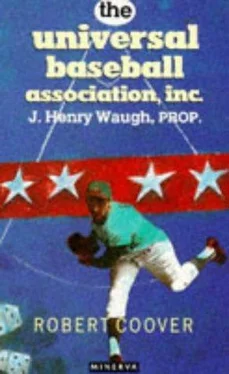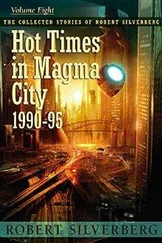"Ah!" said Henry, and: "Ah!"
And even bobbingly afloat there on those rocky shoulders, there in that knock-and-tumble flood of fans, in a wild world that had literally, for the moment, blown its top, Damon Rutherford preserved his incredible equanimity, hands at his knees except for an occasional wave, face lit with pleasure at what he'd done, but in no way distorted with the excitement of it all: tall, right, and true. People screamed for the ball. Royce Ingram, whose shoulder was one of those he rode on, handed it up to him. Women shrieked, arms supplicating. He smiled at them, but tossed the ball out to a small boy standing at the crowd's edge.
Henry opened the refrigerator, reached for the last can of beer, then glanced at his watch: almost midnight — changed his mind. He peered out at the space between his kitchen window and the street lamp: lot of moisture in the air still, but hard to tell if it was falling or rising. He'd brooded over it, coming home from work: that piled-up mid-autumn feeling, pregnant with the vague threat of confusion and emptiness— but this boy had cut clean through it, let light and health in, and you don't go to bed on an event like this! Henry reknotted his tie, put on hat and raincoat, hooked his umbrella over one arm, and went out to get a drink. He glanced back at the kitchen table once more before pulling the door to, saw the dice there, grinned at them, for once adjuncts to grandeur, then hustled down the stairs like a happy Pioneer headed for the showers. He stepped quickly through the disembodied Street lamp glow at the bottom, and whirling his umbrella like a drum major's baton, marched springily up the street to Pete's, the neighborhood bar.
N-o-O-O-o Hit Nealy!
Won his fame
Spoilin' Birdie Deaton's
Per-her-fect game!
The night above was dark yet the streets were luminous; wet, they shimmered with what occasional light there was from street lamps, passing cars, phone booths, all-night neon signs. There was fog and his own breath was visible, yet nearby objects glittered with a heightened clarity. He smiled at the shiny newness of things springing up beside him on his night walk. At a distance, car head lamps were haloed and tail-lights burned fuzzily, yet the lit sign in the darkened window he was passing, "Divineform Foundations: Two-Way Stretch," shone fiercely, hard-edged and vivid as a vision.
The corner drugstore was still open. A scrawny curlyheaded kid, cigarette butt dangling under his fuzzy upper lip, played the pinball machine that stood by the window. Henry paused to watch. The machine was rigged like a baseball game, though
the scores were unrealistic. Henry had played the machine himself often and once, during a blue season, had even played off an entire all-UBA pinball tourney on it. Ballplayers, lit from inside, scampered around the basepaths, as the kid put english on the balls with his hips and elbows. A painted pitcher, in eternal windup, kicked high, while below, a painted batter in a half-crouch moved motionlessly toward the plate. Two girls in the upper corners, legs apart and skirts hiked up their thighs, cheered the runners on with silent wide-open mouths. The kid was really racking them up: seven free games showing already. Lights flashed, runners ran. Eight. Nine. "The Great American Game," it said across the top, between the gleaming girls. Well, it was. American baseball, by luck, trial, and error, and since the famous playing rules council of 1889, had struck on an almost perfect balance between offense and defense, and it was that balance, in fact, that and the accountability — the beauty of the records system which found a place to keep forever each least action — that had led Henry to baseball as his final great project.
The kid twisted, tensed, relaxed, hunched over, reared, slapped the machine with a pelvic thrust; up to seventeen free games and the score on the lighted panel looked more like that of a cricket match than a baseball game. Henry moved on. To be sure, he'd only got through one UBA pinball tourney and had never been tempted to set up another. Simple-minded, finally, and not surprisingly a simple-minded ballplayer, Jaybird Wall, had won it. In spite of all the flashing lights, it was — like those two frozen open-mouthed girls and the batter forever approaching the plate, the imperturbable pitcher forever reared back — a static game, utterly lacking the movement, grace, and complexity of real baseball. When he'd finally decided to settle on his own baseball game, Henry had spent the better part of two months just working with the problem of odds and equilibrium points in an effort to approximate that complexity. Two dice had not done it. He'd tried three, each a different color, and the 216 different combinations had provided the complexity, all right, but he'd nearly gone blind trying to sort the colors on each throw. Finally, he'd compromised, keeping the three dice, but all white, reducing the total number of combinations to 56, though of course the odds were still based on 216. To restore — and, in fact, to intensify — the complexity of the multicolored method, he'd allowed triple ones and sixes—1-1-1 and 6-6-6—to trigger the more spectacular events, by referring the following dice throw to what he called his Stress Chart, also a three-dice chart, but far more dramatic in nature than the basic ones. Two successive throws of triple ones and sixes were exceedingly rare — only about three times in every two entire seasons of play on the average — but when it happened, the next throw was referred, finally, to the Chart of Extraodinary Occurrences, where just about anything from fistfights to fixed ball games could happen. These two charts were what gave the game its special quality, making it much more than just a series of hits and walks and outs. Besides these, he also had special strategy charts for hit-and-run plays, attempted stolen bases, sacrifice bunts, and squeeze plays, still others for deciding the ages of rookies when they came up, for providing details of injuries and errors, and for determining who, each year, must die.
A neon beer advertisement and windows lit dimly through red curtains were all that marked Pete's place. Steady clientele, no doubt profitable in a small way, generally quiet, mostly country-and-western or else old hit-parade tunes on the jukebox, a girl or two drifting by from time to time, fair prices.
Henry brought his gyrating umbrella under control, left the wet world behind, and pushed in.
"Evening, Mr. Waugh," said the bartender.
"Evening, Jake."
Not Jake, of course, it was Pete himself, but it was a longstanding gag, born of a slip of the tongue. Pete was medium-sized, slope-shouldered, had bartenders' bags beneath hi* eyes and a splendid bald dome, spoke with a kind of hushed irony that seemed to give a dry double meaning to everything he said — in short, was the spitting image of Jake Bradley, one of Henry's ballplayers, a Pastimer second baseman whom Henry always supposed now to be running a bar somewhere near the Pastime Club's ball park, and one night, years ago, in the middle of a free-swinging pennant scramble, Henry had called Pete "Jake" by mistake. He'd kept it up ever since; it was a kind of signal to Pete that he was in a good mood and wanted something better than beer or bar whiskey. He sometimes wondered if anybody ever walked into Jake's bar and called him Pete by mistake. Henry took the middle one of three empty barstools. Jake — Pete — lifted a bottle of VSOP, raised his eyebrows, and Henry nodded. Right on the button.
The bar was nearly empty, not surprising; Tuesday, a working night, only six or seven customers, faces all familiar, mostly old-timers on relief. Pete's cats scrubbed and stalked, sulked and slept. A neighborhood B-girl named Hettie, old friend of Henry's, put money in the jukebox — old-time country love songs. Nostalgia was the main vice here. Pete toweled dust from a snifter, poured a finger of cognac into it. "How's the work going, Mr. Waugh?" he asked.
Читать дальше












